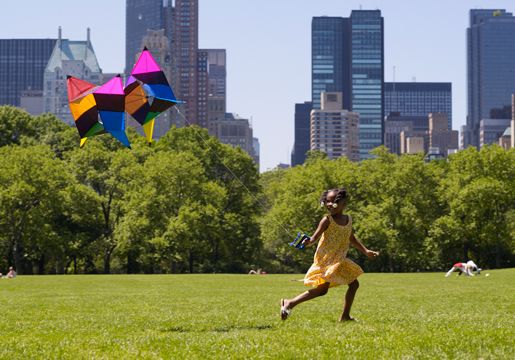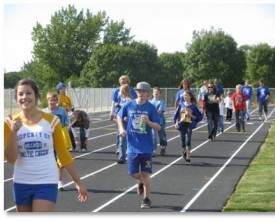We Can!® Events and Challenges Get Baltic, SD Students Moving

Realizing there was a need for health programming in Baltic, the high school's Health and Wellness Committee conducted their own background research and learned that South Dakota's obesity rates increased by more than 90% between 1995 and 2012, with 29% of the population now in the obese range. After surveying middle and high school students, the committee also discovered that 70% of Baltic students play one or more hours of video games a day and two-thirds eat three or fewer servings of vegetables per day. To address the clear needs identified in this research, teachers at Baltic High School began a series of fun and healthy events that encourage healthy eating by increasing nutritional knowledge and access, promoting increased physical activity, and reducing screen time—the core principles of We Can!. Recently, students, parents, and teachers participated in two organized events—We Can! Have a Healthy Homecoming! and We Can! Get Students Moving! Fitness Challenge—along with many other school-day activities.
 Students from Baltic High School took to the tracks for a mile-long walk during the We Can! Have a Healthy Homecoming! event series.
Students from Baltic High School took to the tracks for a mile-long walk during the We Can! Have a Healthy Homecoming! event series.
For the We Can! Have a Healthy Homecoming! event series, Baltic High School turned homecoming into a platform for healthy choices. Activities included a mile walk on the school's new track following the pep rally, cheerleaders leading the crowd in jumping jacks during the football game, and the availability of healthy snacks at sporting events, such as carrot sticks and pretzels instead of buttered popcorn and hot dogs. During homecoming week, high school students even went to the local elementary school and taught lessons from We Can!'s Go, Slow, Whoa Foods tip sheet![]() (106 KB) to the younger children.
(106 KB) to the younger children.
Following the homecoming event, the school's Health and Wellness Committee organized a We Can! Get Students Moving! Fitness Challenge for 2012. During the challenge, 167 participants competed in teams of eight to log over 265,000 minutes of physical activity—an average of over 1,500 minutes per person! Teams included people of all ages, from preschool students to parents and grandparents. Weekly fitness logs were sent home with the groups, and each person logged their physical activity on a daily basis. The team with the most minutes won We Can! gym bags, and every participant received a We Can! Get Baltic Moving! drawstring backpack. Funding for the duffel bags and backpacks, as well as nutritious snacks and other incentives, came from a $2,000 mini-grant awarded by the South Dakota Department of Education and U.S. Department of Agriculture's Team Nutrition following a We Can! training held in South Dakota in July 2011.
On an ongoing basis, the Health and Wellness Committee awards students with stickers if they are "caught" with a healthy snack and also places stickers on healthy snack options in the school vending machines. If a student chooses the healthy snack, they can bring the sticker to a classroom for a prize. Students were also sent home with healthy recipes and We Can! tip sheets to encourage healthy living both in and out of the classroom.
In their efforts to launch their healthy programming, the Health and Wellness Committee made sure to involve people of all ages and abilities in We Can! activities. Learn from their successes with these tips to get your community moving:
- Use a team approach for fitness or similar challenges. Incomplete groups will have to recruit their friends and family members, making your participation more robust. During the We Can! Get Students Moving! Fitness Challenge, Baltic required that each team be made up of two adults, two high school students, two middle school students, and two elementary students. To ensure that teams are fair and have a wide range of participation across the community, be sure to recruit participants that vary in age.
- Provide incentives. Not every community can provide gym bags as the grand prize for the winning team, but even the smallest reward can add a bit more encouragement in your challenge. Try partnering with stores or companies in your area and have them donate gifts for winners.
- Get to know your community. As shown by the survey this community conducted with their students, research can tell you a lot about your audience. A simple survey may help you adapt We Can! programs to better meet the needs of your community.










